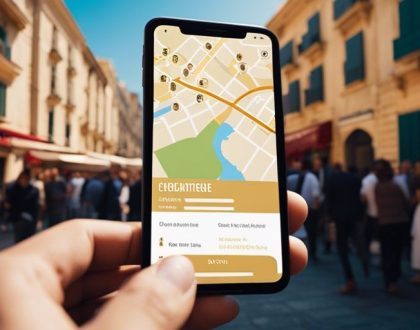Guidelines to Create an SEO-Friendly Website

Building a website can be a daunting task, but creating one that is search engine optimized is even more challenging. SEO is an essential component of digital marketing, and it’s crucial to optimize your website for search engines to increase traffic and improve user experience. In this article, we’ll discuss some guidelines to create an SEO-friendly website.
Understanding SEO
Before we delve into creating an SEO-friendly website, it’s essential to understand what SEO is. SEO, or Search Engine Optimization, is the process of optimizing your website to rank higher in search engine results pages (SERPs). It involves various techniques that improve the quality and quantity of traffic to your website from search engines like Google, Bing, or Yahoo.
Steps to create an SEO-friendly website
1. Define your target audience and goals
Before creating a website, it’s crucial to define your target audience and goals. Understanding your target audience will help you create content and design your website to cater to their needs. It’s also essential to set goals that align with your business objectives, such as increasing website traffic, generating leads, or boosting sales.
2. Conduct keyword research
Keyword research is the process of finding and analyzing search terms that people use to search for products, services, or information related to your business. Conducting keyword research will help you understand what your target audience is searching for and how to optimize your website for those keywords.
3. Optimize your website’s structure
Your website’s structure plays a crucial role in SEO. It’s essential to ensure that your website has a clear and organized structure that makes it easy for users and search engines to navigate. You should also optimize your website’s URL structure, use descriptive titles and meta descriptions, and include header tags (H1, H2, H3) to structure your content.
4. Create quality content
Creating quality content is one of the most critical aspects of SEO. Your content should be informative, engaging, and relevant to your target audience. It’s also essential to use relevant keywords naturally in your content to improve its search engine visibility.
5. Optimize for mobile
With the majority of online traffic coming from mobile devices, it’s crucial to optimize your website for mobile. Ensure that your website is responsive, loads quickly, and has a mobile-friendly design.
6. Improve page speed
Page speed is a crucial factor in SEO. A slow-loading website can negatively impact your search engine ranking and user experience. You can improve your website’s page speed by optimizing images, reducing the number of HTTP requests, and using a content delivery network (CDN).
7. Use internal and external links
Internal and external links play a crucial role in SEO. Internal links help search engines crawl and index your website, while external links improve your website’s authority and credibility. Ensure that your website has a healthy mix of internal and external links.
8. Use social media
Social media can be a powerful tool to drive traffic to your website and improve its search engine visibility. Ensure that your website has social sharing buttons, and regularly share your content on social media platforms.
9. Monitor and analyze your website’s performance
Monitoring and analyzing your website’s performance is crucial to identify areas of improvement and track your progress. Use tools like Google Analytics to track your website’s traffic, bounce rate, and other key metrics.
Conclusion
Creating an SEO-friendly website requires a lot of effort and dedication, but it’s crucial to improve your website’s search engine visibility and user experience. By following the guidelines mentioned above, you can create a website that is optimized for search engines and caters to your target audience’s needs.
FAQs
- What is SEO, and why is it important for my website?
SEO stands for Search Engine Optimization. It is the process of optimizing your website to rank higher in search engine results pages (SERPs). SEO is important for your website because it helps improve its visibility and attract more organic traffic from search engines. - How long does it take to see the results of my SEO efforts?
The results of your SEO efforts can vary depending on several factors, such as your website’s age, the level of competition in your industry, and the quality of your SEO strategy. However, you can typically start seeing results within a few weeks or months of implementing your SEO strategy. - Do I need to hire an SEO expert to optimize my website?
While you don’t necessarily need to hire an SEO expert, it can be helpful, especially if you’re not familiar with SEO. An SEO expert can provide you with insights and strategies to optimize your website and improve its search engine visibility. - Can I do SEO myself, or do I need technical skills?
You can certainly do SEO yourself, even if you don’t have technical skills. However, some technical knowledge can be helpful in implementing certain SEO strategies, such as optimizing your website’s structure or implementing schema markup. - What are the most important factors that influence my website’s search engine ranking?
There are many factors that influence your website’s search engine ranking, but some of the most important ones include quality content, relevant keywords, backlinks from reputable sources, and user experience. - How can I optimize my website for local search?
To optimize your website for local search, you can use local keywords, create local content, optimize your Google My Business listing, and get listed in local directories. - What are backlinks, and how do they affect my website’s SEO?
Backlinks are links from other websites that point to your website. They are important for SEO because they signal to search engines that other websites consider your content valuable and relevant. - Can I buy backlinks to improve my website’s SEO?
No, you should never buy backlinks. Buying backlinks is considered a black hat SEO tactic and can result in penalties from search engines. - How do I know if my website is penalized by Google?
If your website is penalized by Google, you may notice a sudden drop in your search engine ranking, a warning message in your Google Search Console, or a manual penalty notice from Google. - What are the best practices for on-page SEO?
Some best practices for on-page SEO include using relevant keywords, optimizing your titles and meta descriptions, using header tags to structure your content, and optimizing your images. - How do I optimize my website’s images for SEO?
To optimize your website’s images for SEO, you can use descriptive file names, optimize your alt tags, compress your images, and use a content delivery network (CDN). - What is a sitemap, and why is it important for SEO?
A sitemap is a file that lists all the pages on your website. It’s important for SEO because it helps search engines crawl and index your website more efficiently. - Should I use paid search (PPC) or organic search (SEO) to drive traffic to my website?
Both paid search (PPC) and organic search (SEO) can be effective ways to drive traffic to your website. However, each has its own benefits and drawbacks, and the best strategy for your website will depend on your goals and budget. - How can I improve my website’s user experience for better SEO?
To improve your website’s user experience for better SEO, you can focus on improving your website’s loading speed, optimizing your website for mobile devices, ensuring your website is easy to navigate and has a clear structure, and providing high-quality, relevant content that engages your audience.
- Can social media help my website’s SEO?
While social media doesn’t directly impact your website’s search engine ranking, it can indirectly affect your SEO efforts by driving traffic to your website and increasing your brand’s visibility. - What are some common SEO mistakes to avoid?
Some common SEO mistakes to avoid include keyword stuffing, using irrelevant keywords, buying backlinks, ignoring user experience, and neglecting mobile optimization. - How do I optimize my website’s content for voice search?
To optimize your website’s content for voice search, you can use long-tail keywords, create content that answers common questions, optimize for featured snippets, and ensure your website is mobile-friendly. - How can I track my website’s SEO performance?
You can track your website’s SEO performance using tools like Google Analytics, Google Search Console, and other SEO analysis tools. - What are the best tools for SEO analysis?
Some of the best tools for SEO analysis include Google Analytics, Google Search Console, SEMrush, Ahrefs, and Moz. - How often should I update my website’s SEO strategy?
Your website’s SEO strategy should be regularly reviewed and updated as needed. It’s essential to keep up with changes in search engine algorithms and industry trends and adjust your strategy accordingly to ensure your website’s continued success.
Recommended Posts

Overview of Business Finance in Malta
May 17, 2024

How to Start Your Malta Business Journey
May 17, 2024

WA.Technology Offers Centurion FC Odds
May 17, 2024



